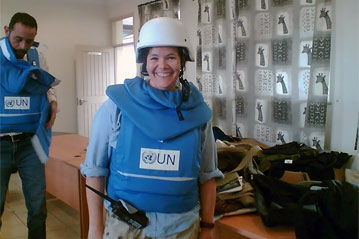Seven Tips For Becoming An International Aid Worker
Posted at Forbes: http://www.forbes.com/sites/alexandratalty/2013/10/10/millenial-thursdays-the-down-and-dirty-of-international-aid-work/ by Alexandra Talty

Four months in Myanmar, three months in Yemen and then five months in Turkey. While most of these destinations sound like many people’s worst nightmare, there is a certain type of person to whom these sound ideal: international aid workers.
Imagine living in the bush in sub-Saharan Africa working 10, 12-hour days, hundreds of miles away from anything resembling a city, to coordinating aid packages for war refugees in less-than-safe locations, to being the first crew on the ground after an international disaster like a tsunami. Friendships form fast when you live with your colleagues, spending the weekends exploring your new home base together. Sprinkle in some R & R to exotic locales with work buddies, a few weeks back home visiting wherever you grew up, and you have the lifestyle down pat. While one might choose to invest themselves longer in a particular country or region, the life and work of a humanitarian is vastly different than your typical 9 – 5 grind.
However, despite the long hours and penchant for danger, working ‘in the field’ for an NGO remains one of the hardest careers to snag post-college.
“It is not an easy sector to get into,” says Martha Reggiori-Wilkes, a millennial who has worked with an international NGO in both South Sudan and Lebanon. “It can sound like a quite romantic thing to do. And there are lot of very, very good people who want to do it.”
1. Educate Yourself
Unless you have extensive volunteer experience, a master’s degree is a ‘must’ for the NGO world. When looking at her own professional career path, Reggiori-Wilkes says, “I probably wouldn’t have been able to get my internship [without my masters], especially because, in terms of experience, I only had two months volunteering in Asia.”
Although a master’s degree doesn’t have to be completely aimed at a humanitarian crisis skill like food security, it should work on something applicable, either through a course of study or dissertation.
“My masters was in Global Citizenship Identity and Human Rights so it wasn’t specific about working for humanitarian crises or something like that, but my dissertation focused on children associated with armed groups,” explains Reggiori-Wilkes.
2. Volunteer
Even with a master’s degree, it is close to impossible to land your first job without some internship experience on your CV. Regrettably for do-gooders everywhere, unpaid internships are the norm for NGOs.
“Often you have to do unpaid work to start with and for a lot of people, voluntary work is not an option. Unfortunately the hypocrisy of the aid world is that although you are helping people in developing countries, a lot of people are disadvantaged from getting into the sector,” says Reggiori-Wilkes, adding that some humanitarian agencies are actively trying to change this through traineeships that do offer stipends.
3. Look Local
If you don’t have the resources to volunteer abroad for a few months or work an unpaid internship, Reggiori-Wilkes advises to volunteer with a small, local NGO where you are living. It will give you some experience in the meantime and might end up opening doors in the future. An added bonus is that you can keep your day job while volunteering, ensuring that you have a steady paycheck.
Sites like Idealist.com can help match you with organizations to volunteer with, depending on your interests. If your goal is ultimately to work abroad, try to find NGOs that specialize in refugee-related issues. An added bonus would be to work with a refugee population from the area of the world you are most interested in. Not only will it stand out on your CV, but it will help acclimate you to the culture that you are interested in experiencing.
4. Bring A Skill
Having skills like nutrition, finance or nursing can also be an easy way to fast-track your career with a humanitarian organization. Although one still has to have a master’s degree, there are fewer twentysomethings with a skill like finance who want to work in a developing country.
“If you’re a nurse, then it is quite easy to get a job because then you have a specialist skill. Or if you are a nutrition expert, that is helpful as well,” explains Reggiori-Wilkes. However, even if you bring a needed skill to the table, “you will have needed to first spend some time in a developing country [volunteering] in order to get a paid job with an NGO.”
5. Plan Ahead
What areas of the world interest you? Research conflicts in the region and see how your abilities align. Although this strategy won’t work for an emergency response to something like an earthquake, try to get to the crisis earlier than most so that you are on the ground at the beginning of the humanitarian efforts.
“I had wanted to get involved in the Syria response. I thought that in terms of, well I was interested in the region. Professionally I knew, and I am right, that Lebanon is where people will be going,” says Reggiori-Wilkes. “I got [to Lebanon] earlier than most people, before it got crazy big. When I arrived [in August 2012], there were only 18,000 refugees in Lebanon and suddenly [the Syrian refugee crisis] became massive.”
In Lebanon today there are over 786,000 Syrian refugees, according to the United Nations High Commissioner for Refugees (UNHCR). Since that number only accounts for registered refugees, many put the number higher than one million.
After studying Arabic in London for a few months, Reggiori-Wilkes packed up and moved to Lebanon. She signed up for a one-month course of study in Beirut and then sent emails to former colleagues who had begun scaling up to respond to the crisis. She has been able to move up the ladder because she was involved with the Syrian response from the beginning.
6. Own The Head Office
Instead of lamenting the work of a head office, own it. A year’s stint at the head office of an international humanitarian organization could be your ticket to the world, connecting you to the right people for the next two, three, even four jobs down the line.
“I was working on a humanitarian team where you had people who were based in developing countries, coming through the London office all the time so I was meeting lots of different people, working for my organization in different countries,” says Reggiori-Wilkes. “You can capitalize on that.”
Have patience if you are working the head office route as “some people…will have masters and they will have worked in an admin role in the London office, sometimes for years before they get the chance to work in the field,” says Reggiori-Wilkes.
The millennial is careful to add that networking will only get you so far and you have to back it up with good work. If your peers or superiors notice your work, they are more likely to connect you with the right people and support your long-term career goals.
7. Scour the Web
Once you’ve got the skills and experience, it’s time to hit the world wide web looking for job opportunities. Search sites like Reliefweb.int, Trust.org or DevNetJobs.org for international postings. Or go local, looking for job boards specific to your country of interest. For example, Lebanon has a site called Daleel-Madani.org where only humanitarian jobs in Lebanon are posted.
If you are a patriot, try looking on the website of your foreign ministry, as they will list humanitarian jobs on projects that they fund. Passionate about a particular organization like Doctor’s Without Borders or One Acre Fund? Check their website regularly for new positions.
Personally, Reggiori-Wilkes has enjoyed her experience of living and working abroad. However, she has seen downsides of the lifestyle. Although she loves working for a humanitarian aid organization, she “[has] a lot of friends in the sector who when they go home…feel very detached. They are doing such different work and living in such different worlds.” While exposure to a different world might be the hook of NGO work for some, it is important to understand the hazards of the exceptional lifestyle.
Bonding with fellow ex-pats, being exposed firsthand to a different way of life, the ability to affect change through work and the opportunity for travel are all reasons why working for a humanitarian agency in a developing country can be such a sought-after job. Not only is the work fulfilling, but it is edifying, immersing you in a completely new culture and way of thinking.




